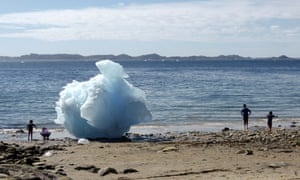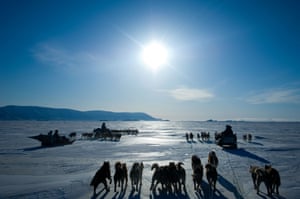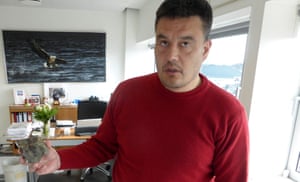https://www.theguardian.com/environment/2016/dec/23/climate-change-in-greenland-adaptation-we-simply-refuse-to-be-victimised
The country set to cash in on climate change
Record temperatures threaten traditional ways of life in Greenland but as the sea ice retreats, new mining, fishing and tourism opportunities are helping communities to adapt
Asked if he is fearful about the impact of climate change, Tønnes “Kaka” Berthelsen’s response is typical of many Greenlanders. “We are more concerned about the Maldives,” he said bluntly.
Greenland has lived with extreme environmental changes for a decade or more. Sea ice is forming two months later and melting one month earlier. Rivers fed by retreating glaciers are at record levels. And temperature records were smashed twice this year, with stunned meteorologists rechecking their measurements after 24C was recorded in the capital, Nuuk, in June.
Traditional hunters are giving up their dog teams because there is three months less hunting on sea ice but climate change is “no disaster”, according to Berthelsen, the deputy manager of Knapk, Greenland’s hunters and fishers’ association. The 56,000 inhabitants of the largest island in the world that is not a continent must adapt, fast.
In the sea, new fish species are arriving. On land, the melting ice is set to reveal a wealth of zinc, iron, uranium, gold, and rare earth elements that some predict will be the largest deposits outside China.
Greenland believes that climate change will bequeath the wealth to win the ultimate political prize: full independence from Denmark. The country gained self-rule in 2009 but its economy is still sustained by a 3.2bn kroner (£362m) annual grant from its former colonial masters.
The vast majority – more than 90% – of Greenland’s export income is from fish, and 2016 was the best ever year, according to Berthelsen. Greenland’s “pink gold”, cold-water shrimp, is moving further north and new fish species – mackerel, herring, cod and Atlantic bluefin tuna – are entering the country’s waters. “We haven’t seen such big cod stocks since the 1970s,” said Berthelsen.
But in the far north, climate change is hastening the decline of hunting. “The traditional way of life is very challenged,” said Bjarne “Ababsi” Lyberth, a biologist and hunting expert for the Association of Fishers and Hunters. People “used to go hunting for weeks on the sea ice. They would go so far out they couldn’t see any land. Now they can travel only for one day by sea ice, there’s too much open water and it’s unstable.”
Greenland has three climate types – polar, Arctic and sub-Arctic – and the effects on the nation, its people and wildlife are varied. In the polar region, hunters report that polar bears “haven’t changed much” said Lyberth, and still look in good health. Further south, the bears have less body fat and are seen more frequently near villages, scavenging for food. Hunters also find it is impossible to store their meat in caches on the ice, as they once did, because hungry polar bears take it.
“The changes that Europe and the rest of the world are becoming aware of have been going on in Greenland for 10 or 20 years,” said Lyberth. “It’s not something that scares people. It’s more a question of adapting.”
Losing three months of sea ice means that hunters are getting rid of their dog teams, which are expensive to feed and maintain, and switching to fishing. But during the long winter darkness it is easier to hunt on ice with dogs than take a boat out fishing.
“Climate change not only has an economic impact but an enormous impact on culture and how we are dealing with traditional lifestyles,” said Aleqa Hammond, the country’s former prime minister, the first female to be elected in 2013, and now a member of the Danish parliament.
“Greenlanders are very good at seeing the new opportunities. We have simply refused to be victimised due to climate change. I am very optimistic. I see more positive options for the country than negatives. I wish that it wasn’t happening but it is and that’s a fact. Once it’s there you have an obligation to do the best out of it.”
Lyberth gives the example of hunters forming small teams to target minke whales as an example of rapid adaptation: “It requires skills and knowledge but the hunters are learning very quickly.” But Hammond says investment is required to turn hunters into fishermen: “Moving from hunting to fishing is not an easy task for many – it requires quite a bit of investment both in equipment but also knowledge to ensure they will be capable of making a living as fishermen.”
New processing facilities will be built in Greenland so it can export “value-added” cod fillets rather than the whole fish: migrant labour may be required to staff these new facilities.
Greenlanders can now buy home-grown potatoes and salad in Nuuk supermarkets but many southern farmers have struggled with drought in 2015 and 2016. Grass growth is stunted, sheep are smaller, and farmers are forced to buy winter food rather than use their own hay. The number of sheep farmers has fallen from 74 in 1983 to about 37 today.
Self-sufficiency in food may be a long way off but 70% of Greenland’s energy is now renewable hydropower from melt-fed rivers. Hammond speaks of 100% renewable energy, and attracting energy-hungry server farms, which companies such as Google and Facebook typically situate inside the Arctic Circle. She also predicts a growth in tourism with ships entering newly ice-free fjords. “Greenland is becoming a new tourist frontier,” she said.
But the vision of a climate-changed Greenland as a tourist-friendly wilderness is challenged by the rapid industrialisation that will occur if Greenland becomes a big mining nation.
Greenland’s move towards independence in 2009 crucially included ownership of its own mineral reserves. Numerous exploratory licences have been issued to multinational mining companies. According to the government’s Ministry of Mining Resources, Greenland’s first mines – a feldspar minerals mine and a ruby and pink sapphire mine – are expected to go into production in 2017. Other mining projects include a zinc mine and a rare earth elements mine, drilling for gold in Nuuk fjord, and “promising” exploratory drilling for a nickel-copper-cobalt mine.
If – or when – the mining boom takes off, Greenland’s indigenous population will be dwarfed by migrant labour. Small countries suddenly enriched by mining often experience corruption or social problems but Hammond insists Greenland has prepared strong laws governing labour rights and mining royalties. The country has established a fund modelled on Norway’s oil-derived sovereign wealth fund.
“Greenland’s parliament has adopted a mineral fund but it doesn’t mean we’ll be going round with a million dollars in each pocket,” said Hammond. “It will not be used in the short-term but will ensure that Greenland is set up for bad days and used with good sense – and with a unanimous vote in the parliament.”
Søren Hald Møller, permanent secretary for Greenland’s prime minister, Kim Kielsen, said the government viewed climate change as a concern, shortening the winter ice season in the north and stopping winter hunting and fishing.
“We know that climate change also creates new opportunities, for example in new pelagic [cod, herring, mackerel] fisheries. But still, no one can just jump from one occupation to another that is completely different,” Møller says. “My hope is that we as a society can adapt in the best possible way to the climatic changes, simply because we as a nation and as a people cannot prevent it.”




沒有留言:
張貼留言